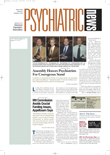Psychiatry needs to rediscover its roots in the community, lost in the movement to “remedicalize” in the last two decades, said Kenneth Thompson, M.D., at APA’s 54th Institute on Psychiatric Services.
Seeking to “reconceptualize psychiatry as a public health discipline,” Thompson urged clinicians at the conference to forge links with partners in the community. These include patients and families, academic institutions, community mental health centers, and public health departments.
He said psychiatry had a critical role to play in advocating for community housing, development, and economic revitalization.
Thompson is an associate professor of psychiatry and public health at the University of Pittsburgh School of Medicine and director of the Institute for Public Health and Psychiatry at Western Psychiatric Institute and Clinic in Pittsburgh. His comments in a lecture at APA’s institute prompted a response from one psychiatrist in the audience who complained about the “complete lack of leadership” at APA in providing support and direction to clinicians working in the community.
Thompson replied that there are psychiatrists within the Association and its leadership who are trying to help psychiatry restore its engagement with the community. However, he said, it was “highly problematic” that the profession had become “so socially disengaged it has seemed to become narrowly focused on guild issues.”
He said psychiatry had moved away from its roots in the community as a reaction to what was perceived by some as the “arrogance” and over-reaching of the community mental health movement in the 1960s in its efforts to effect broad social change.
Thompson said the profession’s increasing disengagement from the community stemmed from the fear of not being funded in the era of biological psychiatry and molecular genetics.
“It has caused us to remedicalize ourselves in a reductionistic fashion,” he said. “Now we have gone in the opposite direction, backing away from any social engagement, with a narrow focus on molecules.”
Thompson said the revolution in molecular genetics has siphoned attention from what are well known to be among the most potent factors in health and illness—social and economic factors. “When you ask the question, ‘What makes some people healthy?,’ people today say, ‘Genes.’ But that is grossly inaccurate. We know a great deal more about the social determinates of health and illness. The most robust finding is that social class and socioeconomic status are entirely related to the burden of health and illness.”
For psychiatrists interested in engaging the community, it is crucial to know where the burden of illness is, Thompson said. That is one reason why practicing clinicians need to partner with health departments and other agencies that have access to population-based health data. He noted that the department of public health in Pittsburgh was virtually alone among municipal or state health departments in including a mental health component as part of its annual Behavioral Risk-Factor Survey.
Thompson suggested that an exclusive focus on pathogenesis should be replaced by a counterbalancing understanding of “salutogenesis”—the processes that produce health.
He said it is possible to identify patterns of behavior that make for healthy communities and that psychiatrists can play a crucial part in encouraging such patterns.
Citing seven patterns of salutogenesis, Thompson said healthy communities practice ongoing dialogue among their members,: embrace diversity, have an active interest in shaping the future, have a knowledge and understanding of themselves and their problems and weaknesses,; generate leadership, connect people and resources, and create a sense of community.
Thompson suggested that the common element in these patterns is the ability on the part of community members and stakeholders to form relationships across conventional boundaries. And he noted that he teaches residents to think of themselves and their patients as “social molecules,” building bridges to others in the community.
“In the information era, expertise is less in the possession of knowledge and more in the relationship between people with knowledge,” he said. ▪
